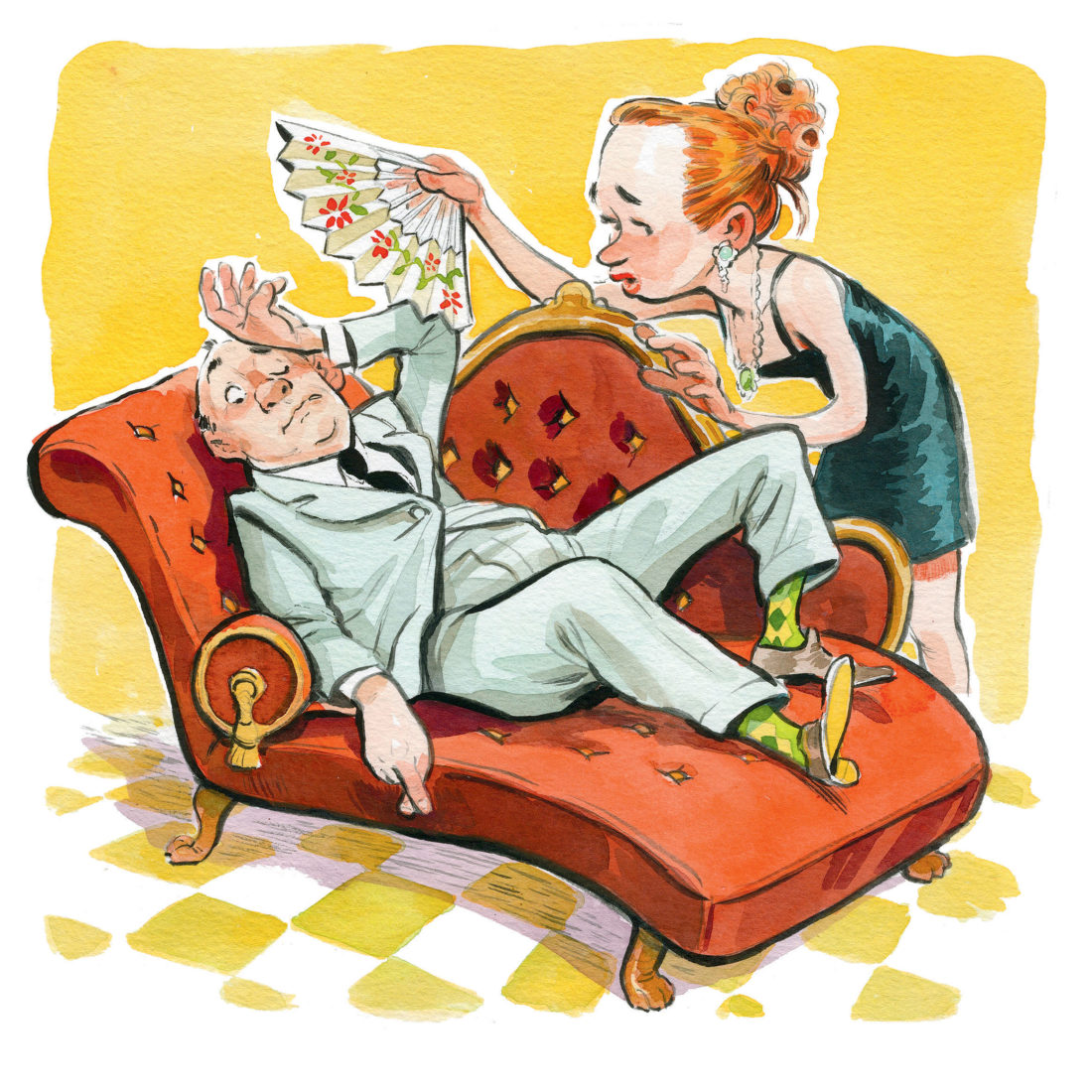Q: Do people still get “the vapors”? We think we might know a few of the afflicted.
A: You know more than a few. The vay-pahs, as my grandmother Minnie mercilessly mocked them, embrace the very finest medical contradiction—they’re wholly imaginary, yet pandemic. Millions have had, do have, and will contract the vapors; ergo, they’re real in a fun, de facto way. Here’s what happened: From the Middle Ages through the Enlightenment, the vapors were assigned to the grab bag of misunderstood “Humours” and “Distempers,” best catalogued by Dr. John Purcell in his 1707 A Treatise of Vapours, or, Hysterick Fits. Which is to say, the vapors became a root diagnosis of whatever circulatory, respiratory, or glandular malady wasn’t truly comprehended. The (mostly male) nineteenth-century medical establishment tried to assign the vapors exclusively to women, arguably because the brutal corsetry of the day caused a few fainting spells. As ever, women were tougher than any male opprobrium and didn’t let the charge stick. By the time my grandmother cut her social teeth, the vapors had been shorn of medical pretense, leaving only the notion of a universal “excuse” in the diagnostic wreckage. This function was weaponized with special delight by Southerners, who relish a sharp social cutting blade. We now use the malady for what it was always best at, to satirize whatever form of foot-dragging evasion is at hand. As in: He gets along with his three ex-wives, but they were all at the reception, so he got the vapors. Or: When they subpoenaed his lawyer, he suffered an attack of the vapors and couldn’t remember much. The takeaway? We’re all human down here on earth. The vapors are ubiquitous, and eternally real, because of that.
Q: Is cussing beside the point these days?
A: The ambient vulgarity in public life has risen like the oceans lately, I’ll admit. But it’s important to distinguish the wearying flood issued by the polity from well-played imprecation to express surprise, consternation, or irony. The trick, as mastered by Chaucer and Shakespeare, is to entertain as you pretend to offend. “Asses are made to bear,” Kate ripostes to Petruchio in The Taming of the Shrew, “and so are you.” Southerners have a leg up on this tactic thanks to our agrarian past. Rather than falling back on hoary Anglo-Saxon verb conjugates, try using this recipe instead. Step 1: Take any barnyard animal—a cow. Step 2: Take any activity of that animal, say, chewing cud. Step 3: Apply that activity to the person in need of satirizing. Presto, instead of saying somebody is “too damn slow,” you can now highlight that fault more snappily as “just flickin’ his tail to keep the flies off his hind end and chewin’ his cud.” The advantages are manifold. You can do this sort of thing in front of the kids, and it elevates the value of the insult by telling your audience you’re putting some effort into the show.
Q: Isn’t there a golden rule for hurricane etiquette? Last storm, the neighbors were surprisingly rude.
A: The South is home to a lot of good people and good things, but it’s also the nation’s primary landfall for hurricanes. We’ve had centuries of storms pirouetting in from the Atlantic to whatever bit of the greater South suits their fancy, which has taught us a big lesson: Hurricane season is the war that doesn’t end. It’s Promethean in every sense; we are bound to the rock each year, and the eagle descends to rip out our livers. It’s useful, then, when considering how to act, to reflect upon the heart-stopping stat that 2017’s hurricane season (which included the three Furies of Harvey, Irma, and Maria) officially took some 3,300 lives, with 3,000 or more deaths in Puerto Rico alone, and bore a financial tally of $282 billion. Put another way, hurricanes require universal care and our best manners—we are all soldiers in the same climate wars. We can’t know from here what your neighbors did, but in wartime, the most surprising people stand fast, and the most surprising people do not. There is no rider to the golden rule that says you have to sacrifice yourself in a hurricane for the sake of others, but when people fail you in that extraordinary circumstance, there’s usually a simple reason. They’re afraid. I recommend forgiveness, and extending yourself to them next time.








